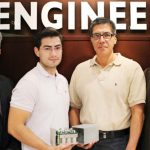Florida Tech Tops Grant Awards from NASA-Space Florida Partnership
Faculty to Study Navigation, Landing Safety, Protein Growth
MELBOURNE, FLA. — Four Florida Institute of Technology aerospace engineering professors and one physics and space science professor have been awarded research grants through the Florida Space Research Program, a partnership between Space Florida and the NASA Florida Space Grant Consortium.
No other university or research organization received as many grants as Florida Tech in this year’s program.
Brian Kaplinger, an assistant professor, received $24,995 for his project, “Mobile GPU Computing for Spacecraft Payloads,” which looks to develop a system for processing navigation and guidance calculations using mobile graphics processing units (GPUs). GPUs are specialized circuits that Kaplinger plans to use because they provide faster computing power and are a relatively low-cost and low-mass piece of equipment, which makes them ideal for navigation and guidance applications.
Kaplinger’s project consists of two major steps. The first is ground- and low-altitude testing of the GPU hardware. Then, working in conjunction with a senior design team from the mechanical and aerospace engineering program, Kaplinger will develop and test a rocket to an altitude of 10,000 to 25,000 feet.
Hamid Hefazi, a professor and head of the Mechanical and Aerospace Engineering Department, was awarded $24,485 for his project, “Discrete Element Modeling (DEM) Of Regolith During Lunar Landing,” which focuses on the interaction of supersonic rocket plumes with regolith, a layer of loose material covering the surface of terrestrial planets.
When a spacecraft takes off or lands on the surface of a planet or another object in space, rocks and particles can fly off the surface and travel long distances, obscuring crew visibility and creating a hazard for the spacecraft and any nearby objects. Along with a graduate student, Hefazi will work to establish a scientific methodology for simulating and predicting these interactions to help avoid dangerous visual and physical hazards in future space missions.
And Daniel Kirk, professor of aerospace engineering and associate dean for research in the College of Engineering, Hector Gutierrez, professor of mechanical engineering, and Samuel Durrance, professor of physics and space sciences, were awarded $12,500 for their project, “Self-Assembly in Biology and the Origin of Life (SABOL),” which will utilize the weightless environment afforded by the International Space Station to study processes such as protein growth.
Kirk, Gutierrez and Durrance, along with students from the colleges of engineering and science, will study the growth processes of these fibers, which will give insight into the cause and cure of neurodegenerative diseases, such as Alzheimer’s disease. In order to complete this research, the team will develop a NanoLab Module laboratory, which will facilitate the study of these processes. This module is versatile enough to handle numerous materials and experimental protocols and it can be easily duplicated, allowing it to be used by future researchers in other experiments.
The Florida Space Grant Consortium is as association of Florida universities and colleges focused on expanding and diversifying Florida’s space industry by providing grants, scholarships and fellowships to students and educators from Florida’s institutes of higher education. FSGC, along with Space Florida, sponsors the Florida Space Research Program annually. In all, 15 projects across nine universities were selected to receive funding this year. Florida Tech has won grants through this program each year since 2000.
###








